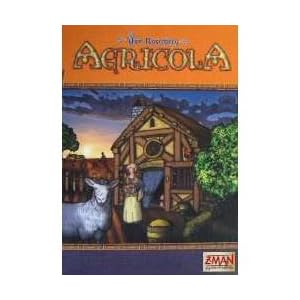Monday, March 15, 2010
Let's Talk Boardgames: Agricola
Agricola is a strategy game that I rank as one of the more challenging games in my collection. What makes this game so challenging is that there is no player-dependent random chance in the game (until you introduce the occupation and improvement cards, but more on that later). The game is entirely about choices that you and others make.
The objective is to expand your 17th century farm to attain victory points, all the while making sure your family is fed. You start the game with two actions (representing your farmer and his/her spouse). Later you can expand your family to get more actions, but now you've got more mouths to feed. Actions include gathering wood, clay or stone. With those resources you can expand and renovate your house and fields. With other actions you can raise animals, plow, sow, and bake your hard-earned grain into bread.
None of the actions are better than any other. The rest of the game is determined by the choices you and your friends make. There's no "attack" actions, the only way to stop a player is to simply take the action they wanted. This can get annoying if it's clear what you want, but a good player will have several possible courses of action.
Now I said that there's no random chance; that's not entirely true. When the game begins you set up 14 action cards for the 14 rounds. Every round there's a new card. These vary in order so that no two games are the same, but since the setup is the same for every player that doesn't really count as chance. It can affect your strategy, however.
The second aspect of random chance is in the improvement and occupation cards. These cards are fully optional. In fact, I'd recommend that new players hold off on the cards until they grasp the rules completely. Each player is dealt 7 from each deck at the beginning of the game. These cards can improve your efficiency in key areas. While these cards are random, you only get them at the beginning and none of them (well, hardly any) are game-breaking. Even the ones that are a bit more powerful still require a series of choices in order to claim them. I have seen players spend several turns trying to meet the conditions of certain cards, only to neglect other aspects of their farms. I have also won games with no cards, while others had far more useful cards simply because I made better choices. In my opinion, the cards add another layer of depth to the game. It's a bad strategy to try and use every card in your hand. I usually pick one or two that coincide with my plan.
Agricola is not a terribly casual-friendly game. It has complex rules and the choices can be completely overwhelming to new players, especially when you add in the cards. However, those looking for a deep strategy game without the luck factor will enjoy this game. It is a bit pricey but you'll be getting years of enjoyment out of this game.
Subscribe to:
Post Comments (Atom)

I bought Agricola for my wife for Christmas... a year or two ago. We've still yet to be able to figure out how to play it.
ReplyDeleteI've been told that it's fundamentally a viral game. That you need to have someone who knows how to play it explain it to you.
It helps, but I figured out how to play the game just by reading. The key is, it's all about choices. Ignore the cards for your first few games. If you really want to figure it out, play a solo game with the rulebook right next to you the whole time. But yeah, it is difficult to figure out but once you get it you'll love the game. Perhaps www.boardgamegeek.com has some tips?
ReplyDelete